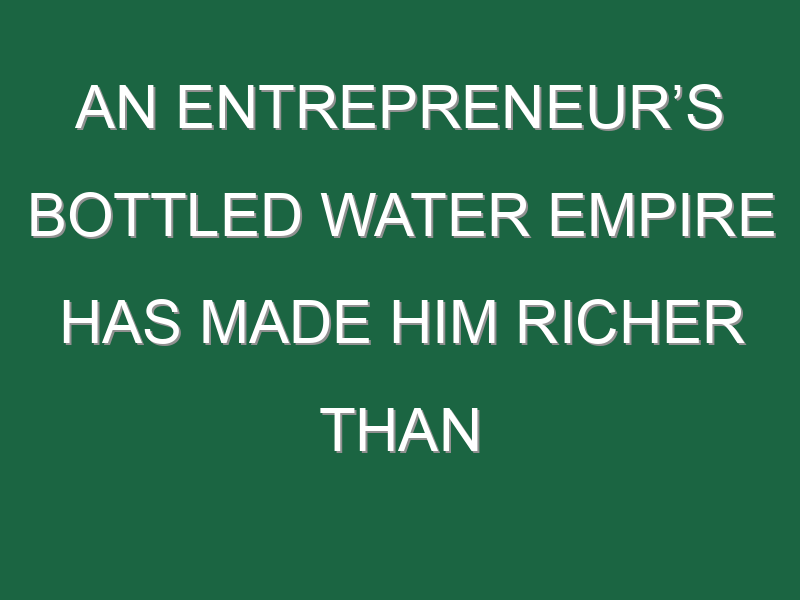Our mission to make business better is fueled by readers like you. To enjoy unlimited access to our journalism, subscribe today.
Zhong Shanshan has turned water into gold.
Zhong, chairman of Chinese bottled water empire Nongfu Springs, has become the sixth richest person on the planet as shares in his company has soared nearly 20% since the beginning of 2021. Zhong’s net worth currently stands at $91.7 billion, just behind Facebook founder Mark Zuckerberg ($103 billion) and higher than American investor Warren Buffett ($86.2 billion), Google founder Larry Page ($82 billion) and Indian tycoon Mukesh Ambani ($75.9 billion).
Zhong’s fortune is now the largest in China. His wealth has surpassed that of Chinese tech tycoons like Pinduoduo founder Colin Huang ($66 billion), Tencent founder Pony Ma ($58.2 billion), and Alibaba founder Jack Ma ($51.5 billion).
Subscribe to Eastworld for weekly insight on what’s dominating business in Asia, delivered free to your inbox.
Yet among these billionaires, Zhong is an oddity in that he makes the majority of his money not from technological break-throughs or well-timed investments, but through a relatively simple business: bottling water and selling it en masse.
Who is Zhong Shanshan?
Zhong was born in 1954 in China’s eastern city of Hangzhou. Growing up amid China’s tumultuous Cultural Revolution, Zhong left school in fifth grade and spent roughly a decade doing odd jobs in carpentry and construction, according to Chinese media.
When China’s Cultural Revolution ended, Zhong got a degree in journalism from a local university and worked as a reporter in the early 1980s. After a five-year stint as a journalist, Zhong attempted to go into business for himself, selling a variety of goods, from mushrooms to nutritional supplements derived from turtles.
In 1996, Zhong turned his entrepreneurial pursuits to water. (He’d previously worked as a salesman for another bottled water company.) He launched Nongfu Springs in his hometown of Hangzhou by selling water bottled from a nearby reservoir to local vendors.
Zhong’s business capitalized on the fact that China’s tap water was—and still remains—mostly undrinkable. In 2016, China’s own Ministry of Water Resources said that more than 80% of the country’s groundwater was unsafe for consumption.
At the same time, China’s bottled water market has skyrocketed alongside the country’s economic boom. The International Bottled Water Association estimates that in 2013 China consumed 39.5 billion liters of bottled water, compared to 2.8 billion liters in 1997.
Zhong’s success can also be attributed to his ability to convince Chinese consumers that Nongfu’s water had a higher quality than its competitors. He boasted that Nongfu only sold natural water and his company’s slogan “Nongfu tastes a bit sweet” became known in households across China.
“Chinese consumers believed sweet water is better water,” Chinese state media wrote in 2016.
Going public
But Nongfu’s claims of having better water came under scrutiny in 2013, when China’s top regulator accused the company of having safety standards for its bottled water that were less stringent than those of the nation’s tap water. In response, Zhong accused his competitors of cooking up the scandal.
Later that year, the government deemed Nongfu’s water safe after conducting tests at its factories, and Nongfu’s sales continued to climb. In 2018, Nongfu was China’s top bottled water seller, controlling a 26% share of the country’s bottled water market. Zhong added other products, like energy drinks and vitamin waters, to the company’s portfolio, and in September 2020 brought the bottled water behemoth to the public market.
Nongfu Springs debuted on the Hong Kong stock exchange at a market valuation of $48 billion. Nongfu’s current market capitalization is now roughly $95 billion.
Nongfu’s success this year can be attributed, in part, to investors seeing it as a safe bet amid a turbulent economic climate. “Its businesses are immune to any global economic shock and U.S.-China tensions,” Vincent Wen, investment manager at KCG Securities Asia, told the Wall Street Journal in September.
Zhong’s other investments also have paid off.
In April 2020, Zhong took public Beijing Wantai Biological, a vaccine maker he founded in 1993 as part of a nutritional supplements business. Beijing Wantai now has a market capitalization of roughly $17 billion on the Shanghai stock exchange.
Zhong has long been nicknamed a “lone wolf” by Chinese media for his reluctance to speak to press or socialize in elite circles. So far, his newfound status as one of the ten richest people on Earth hasn’t changed his low-profile persona.
“I don’t like making friends with business-people,” Zhong told China Daily in 2016. “In the business world, I want it to be just business.”
More must-read retail coverage from Fortune:
- 14 of the biggest bankruptcies of 2020—and who might be next in 2021
- The pandemic cramped Rent the Runway’s style—but here’s how the company is fashioning a comeback in 2021
- From pet adoptions to D.I.Y. home improvement to sweatpants: 10 COVID-fueled consumer trends that will endure
- 21 books to look forward to in 2021
- How Peloton’s $420 million Precor deal positions the company for post-pandemic life




